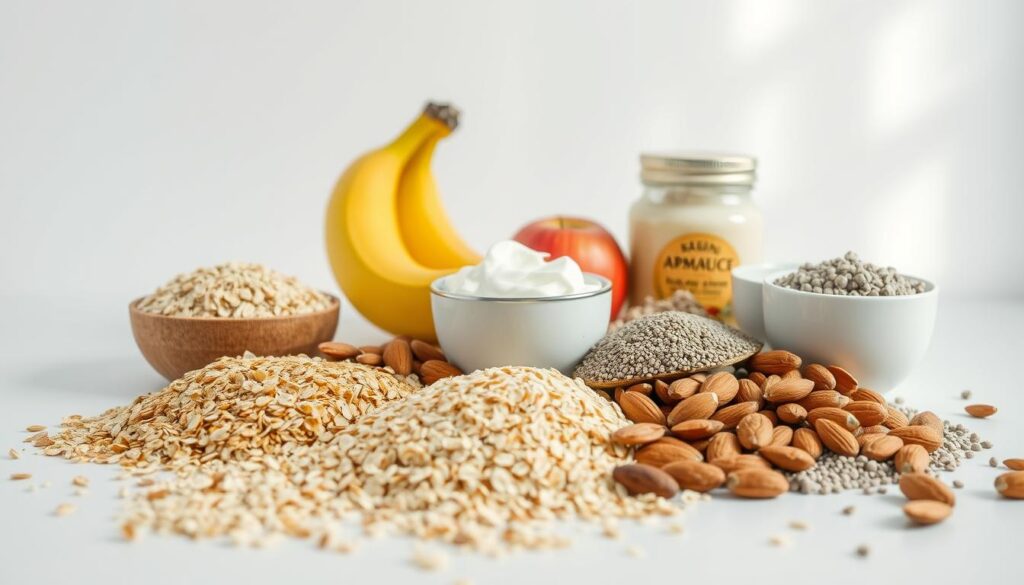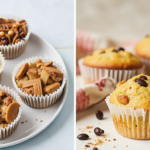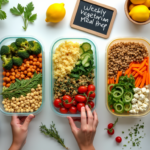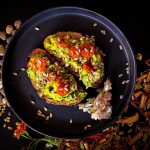The Best Fluffy Pancakes recipe you will fall in love with. Full of tips and tricks to help you make the best pancakes.
Exploring the world of healthy baking opens up endless opportunities to enjoy the delicious treats you love without the guilt. Whether you’re looking to cut calories, reduce sugar intake, or incorporate more nutritious ingredients into your recipes, this guide will help you choose the best healthy baking substitutes for your needs.

🍌 Vegan Banana Bread Recipe Overview
| 🕒 Prep Time | 🔥 Cooking Time | ⏱️ Total Time | 🍽️ Servings | ⚡ Calories per Serving |
|---|---|---|---|---|
| 15 minutes | 30 minutes | 45 minutes | 8 servings | 250 kcal |
🥗 Ingredients:
- 🌱 2 cups almond milk (unsweetened)
- 🥄 ½ cup maple syrup
- 🍞 1 cup coconut flour
- 🥑 ¼ cup avocado oil
- 🥄 1 tsp baking powder
- 🍌 2 ripe bananas (mashed)
- 🌿 1 tsp vanilla extract
🔍 Nutritional Information (per serving):
| Nutrient | Amount |
|---|---|
| 🥦 Protein | 4 g |
| 🍞 Carbs | 30 g |
| 🥓 Fat | 12 g |
| 💧 Fiber | 5 g |
Introduction to Healthy Baking
Baking is often associated with indulgence, but with the right ingredients, you can make healthier versions of your favorite baked goods. From natural sweeteners to flour alternatives, healthy baking substitutes allow you to satisfy your cravings while supporting your health goals. This comprehensive guide will walk you through the most popular and effective substitutes for sugar, flour, fats, and more. You’ll also learn how to incorporate these ingredients into your favorite recipes without compromising taste or texture.
🗝️ Key Takeaways
- Healthy baking substitutes can reduce calorie intake and improve overall health.
- Numerous options for sugar alternatives, flour substitutes, and egg replacements are available.
- With the right knowledge and technique, you can make low-calorie, gluten-free, and vegan baked goods.
- Understanding how different ingredients interact will help you successfully swap traditional ingredients for healthier options.
- Embrace the challenge of baking with healthy substitutes to create tasty treats that align with your dietary needs.
🎂 Understanding the Basics of Healthy Baking Substitutes
Healthy baking isn’t just about swapping out sugar or flour. It’s about understanding how ingredients work together to create the perfect balance of taste, texture, and nutrition.
For example, gluten-free flours often require more liquid and different cooking times than regular flour. Similarly, natural sweeteners like honey or maple syrup may affect the moisture content and sweetness levels of your baked goods. That’s why it’s essential to understand the science behind baking and how each substitution affects the final product.
Why Make Healthy Substitutions?
The benefits of healthy baking go beyond just reducing calories. Many substitutions can improve the nutritional content of your recipes, cater to dietary restrictions, and help you achieve your health goals. By choosing sugar-free options or using natural sweeteners, you can create treats that are not only delicious but also nourishing.
How Substitutions Affect Texture and Taste
Substituting ingredients in your baked goods can drastically change their texture, taste, and appearance. For example, gluten-free flours might result in denser treats, while sugar alternatives can have varying levels of sweetness. It’s important to experiment and adjust your recipes to find the best combination of ingredients for the desired outcome.
🍯 Common Sugar Alternatives and Their Properties
Incorporating sugar substitutes into your healthy baking recipes is key to reducing calories while maintaining sweetness. Here are some popular sugar alternatives and their unique characteristics:
- Honey: 64 calories per tablespoon, rich and sweet flavor.
- Maple syrup: 64 calories per tablespoon, slightly sweeter than honey.
- Coconut sugar: 45 calories per tablespoon, with a mild, caramel-like flavor.
- Stevia: 0 calories per tablespoon, a natural, plant-based sweetener with intense sweetness.
Choosing the Right Sweetener for Your Recipes
When choosing a sugar substitute, consider how it will affect the taste and texture of your baked goods. Honey and maple syrup add moisture and richness, while stevia can drastically reduce calorie content without altering texture. Each sweetener has its own benefits, so experiment to find the one that best fits your recipe and dietary preferences.
🌾 Natural Flour Substitutes for Healthier Baking
Flour is a staple ingredient in many baked goods, but traditional wheat flour can be high in carbohydrates and gluten. Luckily, there are plenty of flour substitutes that offer unique flavors and textures while catering to specific dietary needs.
- Almond flour: High in protein and healthy fats, perfect for low-carb and gluten-free baking.
- Coconut flour: High in fiber and low in carbohydrates, ideal for those following a keto or paleo diet.
- Oat flour: Whole grain flour that’s rich in fiber, great for gluten-free baking.
Adjusting Recipes for Flour Substitutes
Flour substitutes like almond and coconut flour absorb more liquid than traditional flour, so you may need to adjust your recipes to ensure proper consistency. Adding more eggs or liquid ingredients will help maintain the texture and moisture levels in your baked goods.
🥚 Egg Replacements for Vegan Baking
Eggs play a crucial role in baking by providing structure, moisture, and leavening. However, there are plenty of egg substitutes available for vegan baking. Here are some of the most popular options:
- Flaxseed: Mix 1 tablespoon of ground flaxseed with 3 tablespoons of water to replace one egg. This mixture adds moisture and binding to your recipes.
- Chia seeds: Similar to flaxseeds, chia seeds can be mixed with water to form a gel-like consistency that mimics eggs.
- Aquafaba: The liquid from canned chickpeas can be used to replace egg whites in recipes like meringues and macarons.
🥑 Healthy Fat Substitutes in Baking
Fats are essential for adding flavor, texture, and richness to baked goods, but they can also be high in calories. Healthy fat substitutes like plant-based oils and fruit purees can offer the same benefits with fewer calories:
- Olive oil: 120 calories per tablespoon, full of healthy fats and antioxidants.
- Coconut oil: 115 calories per tablespoon, adds a subtle coconut flavor.
- Applesauce: 50 calories per tablespoon, a great fat substitute for moist baked goods.
- Mashed banana: 50 calories per tablespoon, adds natural sweetness and moisture.
By choosing healthier fat substitutes, you can create baked goods that are lower in calories and packed with nutrients.
🥛 Dairy-Free Alternatives for Baking Success
For those following a dairy-free or vegan diet, finding suitable milk alternatives is crucial. Dairy-free milks vary in flavor and fat content, so choose the one that best suits your recipe:
- Almond milk: Light and versatile, great for cakes, muffins, and cookies.
- Soy milk: Creamy and protein-rich, suitable for bread and pastries.
- Coconut milk: Rich and creamy, ideal for puddings, cheesecakes, and creamy desserts.
- Oat milk: Slightly sweet, great for gluten-free baking and pancakes.
⏱️ Time-Saving Tips for Healthy Baking
Efficiency is key when baking with healthy substitutes. Here are some tips to help you streamline the process:
- Pre-measure ingredients like flours, sweeteners, and fats to save time during preparation.
- Prepare purees and egg substitutes ahead of time and store them in the fridge for later use.
- Roast nuts and seeds in bulk to have ready-to-use toppings for various recipes.
⚖️ Recipe Conversion Guide: Traditional to Healthy Baking
When converting traditional recipes to healthier versions, it’s important to keep the following in mind:
- Sugar: Replace refined sugar with natural sweeteners like honey, maple syrup, or stevia.
- Flour: Substitute wheat flour with almond, coconut, or oat flour, adjusting liquid levels as necessary.
- Eggs: Use flaxseed, chia seeds, or aquafaba to replace eggs in vegan recipes.
By making these simple swaps, you can transform your favorite baked goods into healthier versions without sacrificing flavor or texture.
Conclusion: Embrace the World of Healthy Baking
Healthy baking is all about experimentation and finding the right substitutes that work for you. Whether you’re looking to reduce sugar, cut calories, or bake gluten-free or vegan treats, there are plenty of options to explore. Don’t be afraid to experiment with different ingredients, adjust cooking times, and embrace the journey of healthy baking. Your taste buds—and your body—will thank you!
🎥 Watch Tutorial
FAQ
What are the benefits of using healthy baking substitutes? Healthy substitutes reduce calories and enhance the nutritional value of baked goods. They cater to dietary needs without compromising flavor.
How do I choose the right sugar substitute for baking? Consider flavor, sweetness, and how the substitute affects texture. Honey and maple syrup add moisture, while stevia is calorie-free.
What are some good flour alternatives for healthy baking? Try almond flour, coconut flour, and oat flour. Adjust recipes to account for their different absorption rates.
How can I replace eggs in vegan baking? Use flax seed, chia seeds, or Aquafresh to replicate the moisture and structure eggs provide.
What are some healthy fat substitutes for baking? Olive oil, coconut oil, applesauce, and mashed bananas are great alternatives to butter or margarine.
How do I control moisture levels when using healthy substitutes? Experiment with ratios of dry and wet ingredients, and adjust based on your kitchen’s humidity levels.





